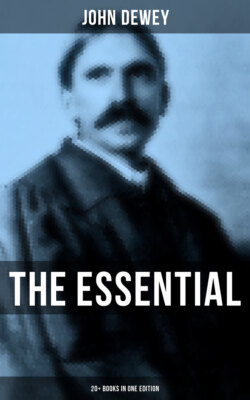Читать книгу The Essential John Dewey: 20+ Books in One Edition - Джон Дьюи - Страница 35
На сайте Литреса книга снята с продажи.
I
ОглавлениеJudgment is essentially instrumental. This is the presupposition which we must explain and make good. And we shall accomplish this by way of an analysis of judgment as meaning.
It cannot be denied that what we call knowledge is concerned with the discrimination of valid meaning. To know is to appreciate the meaning of things and the meaning of things is the same with valid meaning. Judging determines knowledge, and in the same act develops meaning. To put it otherwise, knowledge is a matter of content; content is meaning, and we have knowledge when we have meaning satisfactorily determined. It is evident, therefore, that if we would understand the judging-function, we must first make clear to ourselves the nature and rôle of meaning.
Meaning is universally embodied in ideas. To know, to understand the meaning, to get ideas, are the same. Now, in ideas two factors may be distinguished. First, every idea has as its base an image or emphasized portion of experience. In some forms of ideation we are more immediately aware of the presence of images than in others, but no idea—even the most abstract—can exist apart from an ultimate base. Second, every idea is equally a function of reference and control. As reference, the idea projects in the mind's view an anticipation of experiences and of the conditions upon which these experiences depend for their realization; as control, ideas are agencies in turning anticipations into realizations.54
To be more specific on both points: Since the days of Galton it has been almost a commonplace in psychology that ideas are embodied in forms of imagery which vary for and in different individuals. It has been maintained, it is true, that in abstract forms of thought, imagery disappears. This objection is met in two ways. For one, words—the vehicle of many abstract ideas—involve imagery of a most pronounced type: for another, every idea, when examined closely, discloses an image, no matter how much for the time being this has been driven into obscurity by the characteristics of reference and control. Furthermore, when we examine the anticipatory aspect of ideas, the presence of imagery both with reference to outcome and to conditions is so evident that its presence will scarcely be denied.
The second point may be illustrated in several ways. In everyday life anticipation and realization are inseparable from the nature and use of ideas. "Hat" means anticipation of protection to the head and the tendency toward setting in motion the conditions appropriate to the realization of this anticipation. The same factors are evident in the boy's definition of a knife as "something to whittle with." Again it is maintained that intelligence is an essential factor in human self-consciousness. By this is meant that human beings are universally aware in some degree of what they are about. And this awareness consists in understanding the meaning of their actions, of forecasting the outcome of various kinds of activity, of apprehending beforehand the conditions connected with determinate results. Within this sphere we speak of certain men as being pre-eminently intelligent, meaning that for such men outcomes are previewed and connected with their appropriate conditions far beyond the range of ordinary foresight. Finally, scientific intelligence is essentially of this kind. It aims at understanding the varying types of process which operate in nature and thus at possessing itself of information with reference to results to be expected under determinate conditions. For example, the knowledge acquired in his researches by Louis Pasteur enabled him to predict the life or death of animals inoculated with charbon virus according as they had or had not been vaccinated previously. His information, in other words, became an instrument for the control and eradication of the disease. And what is true of this case is true of all science. To the scientist ideas are "working hypotheses" and have their value only as they enable him to predict, and to control. And while it is true that the scientist usually overlooks the so-called practical value of his discoveries, it is none the less true that in due time the inventor follows the investigator. The investigator is content to construct and show the truth of his idea. The inventor assumes the truth of the investigator's work and carries his idea as a constructive principle into the complications of life. To both men "knowledge is power," although the "power" may be realized in connection with different interests. But if this be true, ideas can no longer be regarded as copies in individual experience of some pre-existing reality. They are rather instruments for transforming and directing experience, by way of constructing anticipations and the conditions appropriate to their realization. Herein also consists their truth or falsity. The true idea is reliable, carrying us from anticipation to realization; the false idea is unreliable, and fails in bringing the promised result.
Now, in the development of instruments generally, we may distinguish a rule-of-thumb or more or less unreflective stage of construction, and one entirely reflective. As to use there is the distinction of inexpert and expert control. This leads us to expect that in the thought-function also certain typical stages of construction and of control may be found. To the investigation of this point we shall next direct attention.
